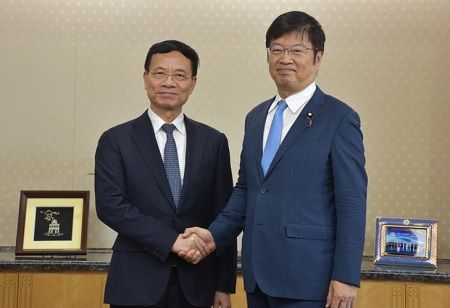- Vietnam and Japan agree to deepen collaboration in AI, digital transformation, and innovation.
- Vietnam will send 60 PhD researchers to Japan, aiming to train 500 skilled professionals and advance chip design, materials, and packaging.
- Both countries plan long-term joint projects, commercialisation of research, and broader tech collaboration to support Vietnam’s development goals.
Vietnam and Japan are stepping up collaboration in science and technology, with a special focus on semiconductors. Minister of Science and Technology Nguyen Manh Hung held meetings with leaders from Japan’s Ministry of Internal Affairs and Communications (MIC) and the Japan Science and Technology Agency (JST) on October 2 during his official visit to Japan.
At the MIC headquarters, State Minister Adachi Masashi welcomed Minister Hung and highlighted the importance of deepening science and technology ties between the two nations. He recalled Japanese Prime Minister Shigeru Ishiba’s visit to Vietnam in April, when the PM pledged stronger collaboration in science and technology, emphasizing that this sector would become a key pillar of bilateral relations.
Minister Hung updated Adachi on Vietnam’s ongoing administrative reforms. He explained that his ministry, formed after merging the former Ministry of Science and Technology with the Ministry of Information and Communications, now oversees science, technology, digital transformation, and innovation. He also noted that over 60 Vietnamese IT companies are currently active in the Japanese market.
Hung shared details of Vietnam’s newly issued artificial intelligence (AI) strategy, which prioritizes mobile infrastructure and AI development. He expressed hope that Japanese companies and government agencies would participate in Vietnam’s AI initiatives and digital transformation projects.
During his visit to JST, Minister Hung met with President Kazuhito Hashimoto, who thanked him for supporting JST’s NEXUS programme, aimed at promoting scientific collaboration with ASEAN countries. Both sides agreed to make semiconductors the main area of cooperation. Vietnam plans to send 60 young PhD researchers to Japan for joint semiconductor research, aiming to train 500 highly skilled professionals for the sector.
Minister Hung emphasized that science, technology, innovation, and digital transformation are the main drivers of Vietnam’s development. He described semiconductors as a strategic field and noted that JST has already signed an agreement with Vietnam’s Department of International Cooperation to conduct joint research in chip design and materials. The two countries are also exploring advanced packaging and co-financing long-term projects lasting five to ten years.
Also Read: Philippine Education Agencies Forge Disaster-Resilient Future
Beyond semiconductors, Hung proposed expanding cooperation into other strategic areas and supporting the commercialisation of research outcomes. Hashimoto welcomed the proposals and said he would submit recommendations to the Japanese government.
Minister Hung concluded by reaffirming Vietnam’s goal of becoming a high middle-income country driven by science and technology, expressing confidence that Japan would continue to be a key partner in achieving this vision.

